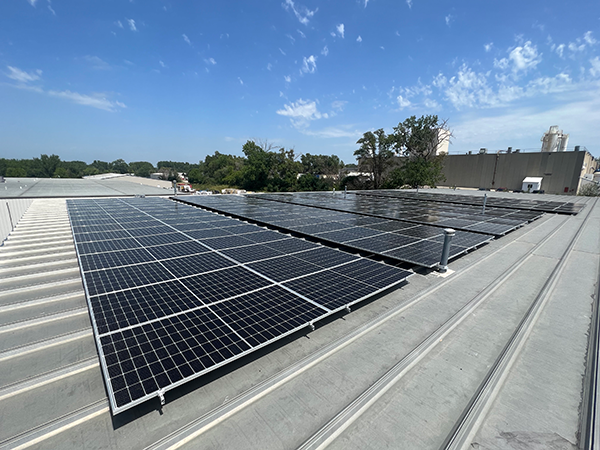
In the heartland of America, where cornfields stretch as far as the eye can see, a new form of energy is emerging as a beacon of sustainable progress. Iowa, renowned for its agricultural prowess, is steadily embracing the power of the sun through commercial solar installations. As businesses in the state seek to reduce their carbon footprint and cut energy costs, the availability of commercial solar incentives in Iowa is catalyzing a significant shift towards renewable energy sources. This article aims to shed light on the thriving landscape of commercial solar in Iowa, the incentives that make it possible, and the steps businesses can take to harness the power of the sun for a brighter and more sustainable future.
Harnessing Solar Power in Iowa
A State Steeped in Solar Potential
Iowa is blessed with an abundance of sunlight, particularly during the sun-drenched summer months. This natural resource has not gone unnoticed by environmentally conscious businesses seeking to harness renewable energy. With an average of 204 sunny days per year, Iowa boasts a solar energy potential that is yet to be fully tapped into.
The Green Energy Transition
In recent years, Iowa has witnessed a significant transition towards green energy. As the state moves away from fossil fuels and embraces renewable alternatives, solar power has emerged as a key player in the shift towards sustainability. Businesses are recognizing the dual benefits of reducing their carbon footprint while simultaneously reaping economic rewards.
Economic and Environmental Gains
The decision to invest in commercial solar power in Iowa is proving to be a sound economic choice. Not only do solar installations significantly reduce electricity bills, but they also open the door to various financial incentives and tax benefits. Moreover, businesses that opt for solar energy demonstrate a commitment to environmental responsibility, appealing to a growing eco-conscious consumer base.
The Rise of Commercial Solar Installations
Iowa’s commercial solar sector is experiencing robust growth. Businesses across industries are increasingly adopting solar energy solutions as they recognize the long-term benefits. The flourishing commercial solar market is a testament to the alignment of profitability with environmental sustainability.
Sustainability as a Business Imperative
Sustainability is no longer a mere buzzword; it has become a business imperative. Companies are incorporating sustainability goals into their strategic plans, not only to meet customer demands but also to enhance their brand reputation. Commercial solar installations are a tangible way for businesses to reduce their carbon footprint and make a positive environmental impact.
Aligning Profitability with Environmental Responsibility
Commercial solar installations not only contribute to environmental well-being but also offer a path to profitability. By generating their electricity from a renewable source, businesses can significantly reduce their energy bills. Additionally, the surplus energy produced can be sold back to the grid, creating an additional revenue stream.
Understanding Commercial Solar Incentives
Iowa’s Supportive Solar Policies
Iowa’s commitment to solar energy is reflected in its supportive policies and incentives. At the state level, various initiatives encourage the adoption of solar power. These policies aim to create a favorable environment for businesses to invest in solar energy.
State-level Initiatives
Iowa offers a range of state-level incentives, including property tax exemptions, sales tax exemptions, and low-interest loans for solar installations. These incentives significantly reduce the financial burden of adopting solar energy for businesses.
Federal Solar Investment Tax Credit (ITC)
Businesses investing in solar installations can also benefit from the Federal Solar Investment Tax Credit (ITC). This federal incentive allows eligible businesses to deduct a percentage of their solar project’s cost from their federal taxes. The ITC has been a crucial driver for the growth of solar energy adoption nationwide.
Net Metering Benefits
Iowa’s net metering policies allow businesses to receive credits on their utility bills for any excess electricity their solar panels generate and feed back into the grid. This effectively reduces electricity costs and ensures a favorable return on investment.
Rebates and Grants
Iowa offers various financial incentives in the form of rebates and grants to promote solar adoption among businesses. These incentives are designed to offset the initial costs of solar installations.
Iowa’s Solar Tax Credits
The state offers solar tax credits to businesses that invest in solar energy systems. These credits can significantly reduce the upfront cost of solar installations and provide a substantial financial incentive for businesses to embrace solar power.
USDA Renewable Energy Grants
The United States Department of Agriculture (USDA) offers grants and loan guarantee programs for renewable energy projects in rural areas of Iowa. These grants can provide critical funding for commercial solar installations in agricultural regions.
Municipal and Utility Incentives
Many Iowa municipalities and utilities offer additional incentives for businesses to invest in solar energy. These incentives may include cash rebates, performance-based incentives, and favorable financing options.
Solar Renewable Energy Credits (SRECs)
Solar Renewable Energy Credits (SRECs) provide an additional avenue for businesses to benefit from their solar installations. SRECs represent the environmental attributes of solar energy production and can be sold on the open market. By trading in these credits, businesses can secure a stream of income in addition to their energy savings.
Incentivizing Solar Adoption
SRECs incentivize solar adoption by offering businesses a financial return for the clean energy they produce. This additional source of revenue enhances the overall economic viability of solar installations.
Securing a Stream of Income
SRECs can provide a consistent stream of income for businesses, further bolstering the return on investment for their solar projects. This income can be particularly valuable in industries with fluctuating revenue streams.
Navigating the Incentive Landscape
Eligibility and Application
Qualifying for commercial solar incentives in Iowa requires compliance with specific eligibility criteria. Businesses must meet these requirements to access the financial benefits of solar adoption.
Qualifying for Commercial Solar Incentives
Eligibility criteria for incentives vary depending on the specific program or incentive. Businesses must ensure that their solar installations meet all the necessary requirements to qualify for the incentives they intend to pursue.
Navigating the Application Process
The application process for solar incentives can be complex and time-consuming. It involves submitting detailed documentation and meeting specific deadlines. To navigate this landscape efficiently, businesses often seek the assistance of experts in solar energy and incentive programs.
Expert Assistance for a Smooth Experience
Many businesses turn to experienced solar consultants and installers who specialize in navigating the incentive landscape. These experts are well-versed in the requirements of different programs and can ensure that businesses maximize their incentive benefits while adhering to all regulations.
Maximizing Returns on Investment
Calculating the Financial Benefits
To maximize returns on their solar investment, businesses should carefully calculate the financial benefits of their solar installations. This involves considering factors such as energy savings, tax credits, rebates, and potential income from SRECs. A comprehensive financial analysis can provide a clear picture of the ROI associated with solar energy adoption.
Integration with Energy Efficiency Measures
Solar installations can be integrated with other energy efficiency measures to further enhance savings. Businesses can invest in energy-efficient lighting, HVAC systems, and insulation to reduce overall energy consumption, thereby increasing the impact of their solar installations.
Long-term Sustainability and ROI
The decision to invest in commercial solar is not just about short-term financial gains; it’s about long-term sustainability. Businesses can secure a positive ROI over the life of their solar systems, reaping financial benefits for years to come while contributing to a more sustainable future.
Overcoming Challenges
Financing and Initial Investment
One of the primary challenges businesses face when considering commercial solar installations is the initial investment required. However, various financing options, such as solar leases and power purchase agreements (PPAs), can alleviate this financial burden by allowing businesses to adopt solar energy with little to no upfront costs.
Regulatory Compliance and Documentation
Navigating the regulatory landscape and ensuring compliance with all relevant documentation can be daunting. Businesses must be diligent in understanding the requirements and deadlines associated with various incentives. Seeking legal and financial advice can be invaluable in this regard.
Evaluating the Right Solar Partner
Selecting the right solar partner is crucial to the success of a commercial solar project. Businesses should conduct thorough research, check references, and assess the experience and expertise of potential solar installers and consultants. Partnering with a reputable and knowledgeable provider can streamline the process and lead to a successful solar installation.
Conclusion
In Iowa, where the sun shines brightly and the commitment to sustainable energy is strong, commercial solar incentives are paving the way for a greener and more economically sound future. Businesses that choose to invest in solar energy not only reduce their carbon footprint but also enjoy substantial financial benefits.
As Iowa continues its transition towards renewable energy sources, the incentives and support available make solar adoption an increasingly attractive option for businesses. By understanding the incentive landscape, maximizing returns on investment, and overcoming potential challenges, businesses can harness the power of the sun and contribute to a sustainable future while reaping the rewards of commercial solar incentives in Iowa.


